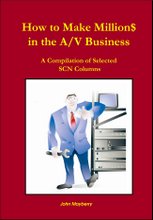By DENNIS K. BERMAN
October 22, 2007 6:36 a.m.
Kohlberg Kravis Roberts & Co. and Goldman Sachs Group Inc. terminated their $8 billion takeover for Harman International Industries Inc., with the two sides agreeing to a far more modest investment that will spare litigation.
Under the agreement, KKR and Goldman's private-equity arm will buy $400 million worth of Harman convertible debt securities. These securities will pay out 1.25% in interest annually, and will be convertible into Harman stock should its shares reach $104 each sometime over the next five years. Harman shares were at $86.40, down $1.18, in 4 p.m. New York Stock Exchange composite trading Friday.
KKR and Goldman won't have to pay the $225 million termination fee called for under the original deal. KKR partner Brian Carroll will also be added to Harman's board.
Harman is just one of many private-equity deals to have been caught in a financial netherworld, where buyers have soured on announced transactions, and are either unable or unwilling to fund their commitments.
The most prominent of these situations is the increasingly bitter feud over student lender SLM Corp. In that case, a $25 billion agreement by buyers J.C. Flowers & Co., J.P. Morgan Chase & Co., and Bank of America, has landed in the Delaware courts.
While the rhetoric of the SLM case has become increasingly hostile, the case of Harman suggests that corporate boards can be practical-minded. "There were no positive outcomes here," said one person involved in the recent Harman negotiations. "The bottom line is what do you want to do to make shareholders the most amount of money over time?"
The Harman agreement is something of a realpolitik solution to what could have been a nasty confrontation between buyer and seller. In April, KKR and Goldman were prepared to pay $120 per share for the well-known maker of audio equipment. But changes in Harman's business results spooked KKR and Goldman, whose damages for breaking the deal were capped at $225 million.
The agreement may not be enough to placate some shareholders. Where Harman was once valued at $8 billion by its suitors, it now carries a market capitalization of $5.6 billion.
Proceeds from the convertible offering will be used to buy back stock, and therefore placate some shareholders.
The agreement spares months of litigation for the Washington, D.C.-based company. A court case would have been unavoidable should Harman have hoped to collect the termination fee. KKR and Goldman were prepared to assert that Harman's business had changed so materially that they didn't need to pay it.
People close to both sides of the Harman transaction said they didn't want to spend tens of millions of dollars for attorneys' fees. Nor were Harman officials keen on dragging the minutiae of their business into public view, said two people familiar with company's thinking.
Write to Dennis K. Berman at dennis.berman@wsj.com
About This Blog:
Integrating complex electronic projects requires industry individuals keep abreast of the latest technological trends.
Some things are important, many ironic, others outright frauds, and a few are just so very wrong. Occasionally the original technological goal and downstream results are in hilarious conflict.
Usually "the latest trends" go back fifty to one hundred years in their development and are only new to the uninformed. In most every case, the ancients have truly stolen our inventions!
As far as we know, this is the only place that collects them and lets you celebrate them for yourself. We'd love to hear from you if you have something we've missed!
Some things are important, many ironic, others outright frauds, and a few are just so very wrong. Occasionally the original technological goal and downstream results are in hilarious conflict.
Usually "the latest trends" go back fifty to one hundred years in their development and are only new to the uninformed. In most every case, the ancients have truly stolen our inventions!
As far as we know, this is the only place that collects them and lets you celebrate them for yourself. We'd love to hear from you if you have something we've missed!
Blog Archive
-
▼
2007
(294)
-
▼
October
(32)
- Using Cameras and Projectors to Hide a Tank
- Great Article on Control Room Design
- Happy Halloween- Strange White Space Story
- Toshiba Paid Paramount for HD DVD Support, But How...
- Leopard vs. Vista
- Guitar Center Sold to Private Investment Firm
- A Company You Never Heard of but Probably Hated Sh...
- Sweet!
- Harman Takeover Canceled, Fight Avoided
- Comcast No Longer Net Neutral?
- Blu-ray Doesn't Like Spidey 3?
- Apple Reverses Position on iPhone Software
- Google Unveils Copyright Filtering Progam
- Muvico Installs Sony 4K Projector System
- Red 4K Camera Gets Final Cut Support Soon
- Boss Won't Let You IM?
- Your Tax Dollars at Work, Part 174
- Bear With Me On This One
- Lead Phase Out May Destroy Electronics
- Sanyo's Dinky Full HD Monster
- Embrace digital or die, EMI told
- Siemens Fined for Bribery
- $220k Download Verdict
- Best PC Mouse?
- More Troubles for Hong Kong Disneyland
- Disney Plans Hawaii Resort Hotel
- I Won't Surrender to Download Bullies, Says Mother...
- HD DVD Recorders Coming Soon
- AccessIT First Quarter Results
- Sony OLED TV for Christmas
- Skype Struggling?
- Financial Times of London on the Harman Purchase D...
-
▼
October
(32)


